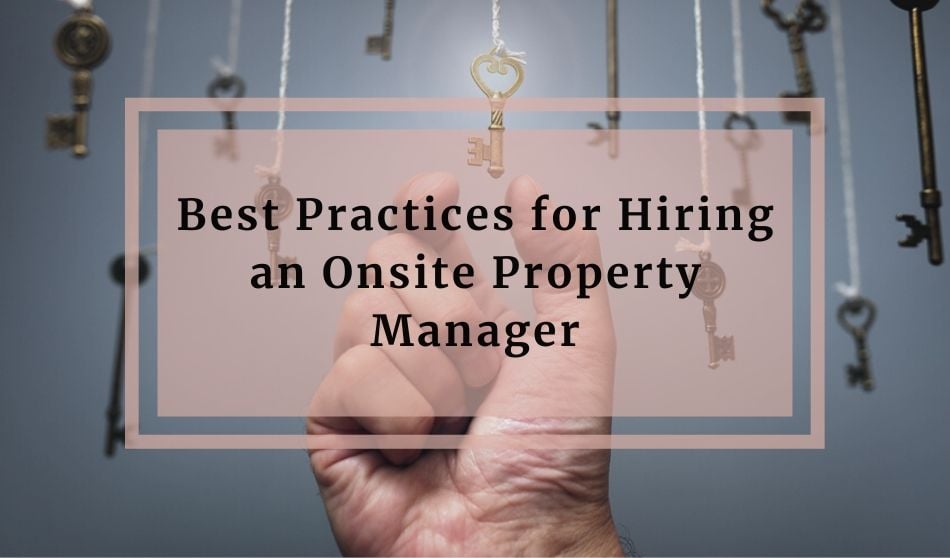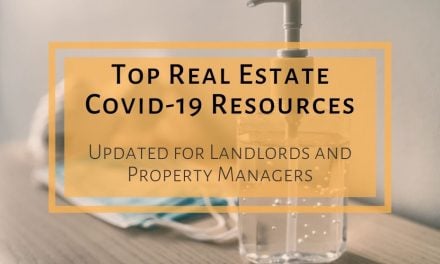
Onsite property managers have an important role in property management. It is a unique occupation in that an onsite property manager acts as a liaison between an owner or property management company and the best interests of the community, of which they reside.
Being the eyes and ears for your asset, hiring an onsite property manager is an important task. Choosing the right candidate effects tenant relations, vacancies and tenant turnover, profitability, reputation, and more.
Onsite Property Management Primer
Apartments, condominiums, mobile home parks, and other communities typically have an onsite office (some call it a leasing office) with regular business hours staffed to collect rents, process property maintenance requests, and conduct the business needed to maintain the property and tenant concerns.
Unlike an on or off-site leasing office where employees live elsewhere, onsite property managers work in that office and live among the community as a resident.
Steps to Hiring an Onsite Property Manager
Hopefully, your resident manager has stayed at the property for a very long time so that hiring an onsite property manager is a task you don’t have to do often. Whether they have moved on to another opportunity within your organization or elsewhere, it’s time to work the process to find a replacement.
One – Review The Community Manager Job Description
Because it’s been a while between hiring, if you haven’t been keeping the job description current, it’s time to dust it off and give it another gander. Some questions to ask yourself as you review the job description.
- Does the description fit the current business and property needs?
- Had your resident manager acquired skills that you’d like your new hire to have?
- Had the onsite manager perform additional tasks not previously listed?
- Are there any new amenities needing upkeep such as a clubhouse or swimming pool?
Two – Draft an Onsite Property Manager Job Posting
Not only are you attempting to attract a great onsite community manager, but also they need to be a team player within the organization and make a good resident. The job posting should speak to all three of those requirements.
Take the recently updated job description as your template and highlight the most important elements within the job posting. You can also add the entire job description as a supplemental attachment or link for them to review.
Be sure to note the added spark you are looking for beyond the skills, education, and experience necessary. Let the candidates know exactly what you are looking for in a teammate and community manager such as friendliness, problem solver, organized, self-managed, or any other term that speaks to the qualities you feel best.
Treat the job posting as a piece of marketing. Outline why your community would be an ideal setting in which to live and work and don’t forget to mention the amenities.
Lastly, remember to include the candidate steps needed to apply such as required documentation and deadlines.
Three – Review Application Packets for Accuracy
Although you may have communicated with a candidate on the phone, or they might have visited the office for an application packet, how they respond to that application packet should be considered as part of your first impression.
When reviewing an onsite property management resume look for accuracy and thorough information, tidiness and readability, and clear communication.
If you required supporting and supplemental information such as a list of references, cover letter, rental history, and the like, be sure that it was included. How they follow your application packet instructions is an indication of the care and attention they will bring to the deadlines, reports, documentation of the job requirements if hired.
Four – Call Every Employment, Character, and Rental Reference
Hearing from others about your candidate can give you a broader perspective of their experiences, personality, and characteristics.
You want your onsite property manager to live and work at that location for a long time. Employee turnover costs are higher for these positions and making the wrong choice can hurt your reputation as well as your profits.
Rental references are vitally important because you want your resident manager to be a model tenant to set the tone for the community.
Five – Conduct a Background Check
It is absolutely essential that within your application packet you have them sign an agreement for you to conduct a background investigation; including a credit check.
Some types of background reports:
- criminal
- eviction
- prior address search
- SSN verification
- credit reports
Six – Conduct Interviews
Phone Interviews
It’s important not to rush the process. Conduct a phone interview first to hear their speaking voice, get acquainted, review any items of question on their application packet or resume. Keep it friendly and short with an understanding you will be conducting a second interview shortly (phone or in-person) and will reach out to them to coordinate if chosen for that round.
The second interview can be more in-depth about experiences, processes, run a few scenario questions by them to see how they think on their toes. Review anything that has come up in the background investigation.
Ask about rental and employment history and get a feel if they are seeking a job or a career in the industry. A few important questions to ask:
- What do you know about our organization (or community) and why they feel they would be a good fit.
- Why were they attracted to an onsite property manager position?
- Who would be living with them onsite? Here you can also ask about pets, vehicles, and other information geared toward the residency aspect of the job.
Onsite, In-Person Interviews
By the time you have in-person interviews, you’ll be well acquainted and it can be a free flow of questions and answers.
Don’t be afraid to ask similar or the same questions as you’ve asked previously to see if their replies are in line with what they said previously.
Walk the property with them, stop and discuss the requirements of the job, and check for understanding and engagement.
Other Considerations
It might be appropriate to do a trial period for them to work in the office as an independent contractor for a few weeks prior to a full-hire. Especially if you are still vetting their background information and decision that they will make a good fit for the property and business.
You may also want to consider using personality and skills testing software or companies.
Final Thoughts
Find the perfect fit is a process but one worth doing carefully. The right candidate and you’ll see a boost in tenant satisfaction, lower vacancy rates, and a well-maintained property, which hopefully translates to higher profits.






You made a good point when you said that I should take the time to contact their referrals to ensure that the one you’ll be hiring will be efficient and would last long. My husband and I plan to invest in a couple of single-family homes to lease to small families living in the city. I’ll follow your advice since employee turnover cost would hurt my profits and reputation, as you said. Thanks!
Glad you found the article useful! Wishing you all the best in your upcoming investments.
Good article. How do people hire onsite managers now a days? we have 30 units and just want someone onsite to keep property clean and maintained, minor repairs plumbing, cleaning vacant apts. etc.
Great question Dana. It sounds as though you are looking for onsite maintenance vs. a manager. I’d recommend writing out the tasks they would be responsible for as the base for your job description and job posting. Then, and most importantly, confirm if an onsite property manager (or maintenance manager) needs to hold a license in your state based on the tasks you wish them to perform. I wrote an article from the other perspective of someone looking to get into the field that might give some insight into those looking for onsite job positions: How to Get into Property Management.
For locating someone to fill the position:
– In addition to paid listing sites such as indeed.com, glassdoor.com, monster.com, etc., craigslist is often free to post available jobs in many markets. You could also contact trade schools and other property management companies for recommendations.
– In these days of social media, you could try Facebook Recommendations to ask your network and social groups if they know of anyone looking for that type of work.
– Or you could hire a property management company to handle all aspects of managing the units including staffing.
Remember before hiring an individual, work with your attorney and accountant to create the employee/tenant relationship and avoid contract and bookkeeping errors. If you go with a property management company, have your attorney review the management agreement. I hope this helps and wish you all the best.